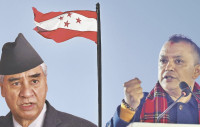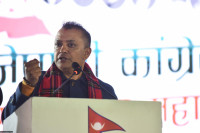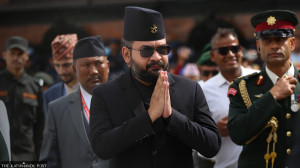Opinion
Problem is governance
The big size of the budget will not necessarily lead to a rise in inflation
Nepal’s economy has been in shambles this past year; it still struggles to revive itself after the earthquake and the Indian blockade. A recovery from this ailing condition of the economy requires an increase in priority sector spending and improved governance. While there is a need to increase expenditure for the post-quake reconstruction, some economists are arguing that the size of this year’s budget will necessarily lead to inflation. The inflated amount of the budget is primarily because of the portion of the budget allocated for reconstruction. In this article, I will try to argue why the inflated budget will not result in higher inflation.
The basics
According to the quantity theory of money, MV=PT, where M is the money supply, V is the velocity of currency circulation, P is price and T is output in an economy. The projected budget deficit this year is about seven percent of GDP. This is a giant leap from the last two years—0.6 and 0.2 percent of GDP in 2014 and 2015 respectively. The argument which is put forth by many mainstream economists is that an increase in fiscal deficit would lead to an increase in inflation. This happens when the deficit is being financed by borrowing from the Rastra Bank which would result in an increase in money supply (M). They assume that an increase in money supply would necessarily result in an increase in inflation (P). This assertion is flawed.
First, this hypothesis is based on the assumption that the Nepali economy is operating at full capacity utilisation and has attained full employment. However, Nepal is neither in full employment (unemployment hovers around 50 percent) nor has full capacity utilisation (domestic capacity utilisation also hovers around 50 percent). To put it differently, Nepal still has room for an increase in output (T), which means that an increase in money supply will not increase inflation. Second,
the risk of increased inflation is based on the assumption that the magnitude with which money changes hands (V) remains constant. This might not necessarily be the case as it depends on a lot of economic variables. Hence, to assert that an increase in the fiscal deficit will necessarily lead to an increase in inflation is incorrect.
There are economists who argue that an increase in fiscal deficit would result in an increase in inflation as the output of certain essential goods cannot be increased because of supply constraints. This argument is also flawed considering the fact that the import intensity of consumption—the percentage of imports out of total consumption—is very high in the economy. Nepal imports a majority of its essential goods, including basic food items, from India. As a result, the inflation pattern in Nepal has been mirroring the inflation pattern of India for over a decade. Lastly, even if we assume a case where there are supply constraints in the economy (in a closed economy without imports like in the recent blockade), any kind of government expenditure would lead to an increase in inflation.
Political hurdles
The budget has been consistently under-utilised in the past decade. The reasons cited by Chandan Sapkota in a recent article in this paper (Unspent budget, May 23) are poor project preparation, populist projects, bureaucratic hassles and bad project management, among others. While his arguments are correct, I think that the issue is rooted in the larger political-economic structure of democracy in Nepal.
A government in a democratic structure is primarily interested in getting re-elected, which is generally prioritised over issues of development. This cannot be more precise in the case of Nepal. Government data show that there is a consistent difference between planned and actual expenditure over the last decade. Had development actually been a top priority for the past governments, they would have at least fully utilised their budget. But all the previous governments have failed to do so. The problem is that despite having low budget utilisation rate over the past decade, there has been little effort to improve the issues of governance, which is crucial to make budget-spending effective. The speech made during the release of the budget this year seemed to be filled with populist programmes. The present government needs to realise that actions speak louder than words and deceit comes at a cost, especially after the recent crises.
Shrestha is research scholar at Institute of Development Studies, Kolkata




 10.12°C Kathmandu
10.12°C Kathmandu









